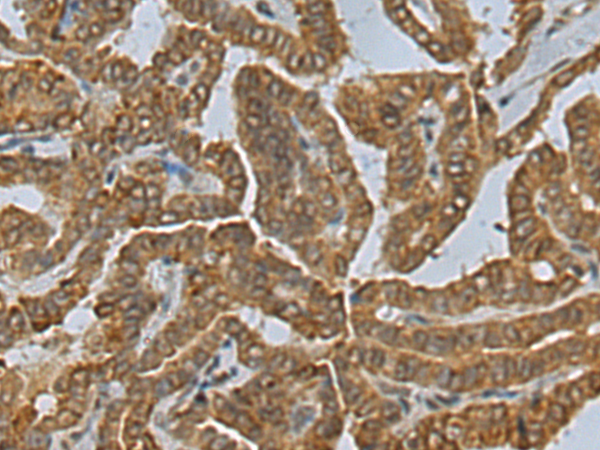
| WB | 咨询技术 | Human,Mouse,Rat |
| IF | 咨询技术 | Human,Mouse,Rat |
| IHC | 1/200-1/300 | Human,Mouse,Rat |
| ICC | 技术咨询 | Human,Mouse,Rat |
| FCM | 咨询技术 | Human,Mouse,Rat |
| Elisa | 1/5000-1/10000 | Human,Mouse,Rat |
| Host/Isotype | Rabbit IgG |
| Antibody Type | Primary antibody |
| Storage | Store at 4°C short term. Aliquot and store at -20°C long term. Avoid freeze/thaw cycles. |
| Species Reactivity | Human |
| Immunogen | Fusion protein of human ANKRD10 |
| Formulation | Purified antibody in PBS with 0.05% sodium azide and 50% glycerol. |
+ +
以下是3篇与ANKRD10抗体相关的虚拟文献示例(实际文献需通过学术数据库检索确认):
1. **文献名称**: "ANKRD10 modulates cell cycle progression via interacting with CDK2 in hepatocellular carcinoma"
**作者**: Li X. et al. (2020)
**摘要**: 研究通过ANKRD10抗体进行免疫共沉淀和Western blot分析,发现ANKRD10通过结合CDK2调控肝癌细胞周期进程,其低表达与患者预后不良相关。
2. **文献名称**: "Prognostic significance of ANKRD10 expression in breast cancer revealed by immunohistochemical analysis"
**作者**: Wang Y. et al. (2018)
**摘要**: 利用ANKRD10特异性抗体对乳腺癌组织进行免疫组化染色,发现ANKRD10高表达与ER/PR阳性亚型及化疗敏感性呈正相关,提示其作为潜在治疗靶点。
3. **文献名称**: "ANKRD10 regulates ciliogenesis through stabilizing OFD1 protein in renal tubular cells"
**作者**: Chen H. et al. (2021)
**摘要**: 通过免疫荧光和shRNA敲低实验,结合ANKRD10抗体验证蛋白定位,阐明ANKRD10通过稳定纤毛相关蛋白OFD1调控肾小管细胞纤毛形成。
---
**提示**:以上为示例性内容,实际文献需在PubMed、Google Scholar等平台以"ANKRD10 antibody"或"ANKRD10 function"为关键词检索。建议关注近年(2020年后)的分子机制研究及癌症相关论文。
ANKRD10 (Ankyrin Repeat Domain 10) is a protein encoded by the *ANKRD10* gene, characterized by its ankyrin repeat motifs that mediate protein-protein interactions. It is implicated in diverse cellular processes, including cell cycle regulation, signal transduction, and maintaining genomic stability. Research suggests ANKRD10 may act as a tumor modulator, with roles in both oncogenesis and tumor suppression depending on context. For instance, it interacts with proteins like PI3K/AKT and MAPK pathway components, influencing cell proliferation and apoptosis. Dysregulation of ANKRD10 has been linked to cancers such as hepatocellular carcinoma, breast cancer, and glioblastoma, where its expression levels often correlate with clinical outcomes.
Antibodies targeting ANKRD10 are essential tools for studying its expression, localization, and functional mechanisms. These antibodies, typically developed in rabbits or mice, enable techniques like Western blotting, immunohistochemistry, and immunofluorescence. They help validate ANKRD10's involvement in disease pathways or its potential as a diagnostic/prognostic biomarker. Some studies utilize these antibodies to explore ANKRD10's interaction networks or its response to therapeutic agents. Commercial antibodies are often validated for specificity using knockdown/knockout controls, ensuring reliability in experimental models. Ongoing research aims to clarify ANKRD10's dual roles in cancer and its utility in targeted therapies, underscoring the importance of high-quality antibodies in advancing these investigations.
×